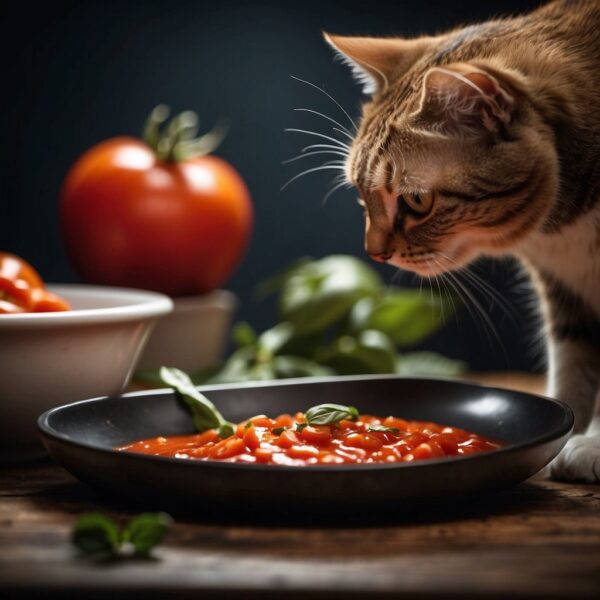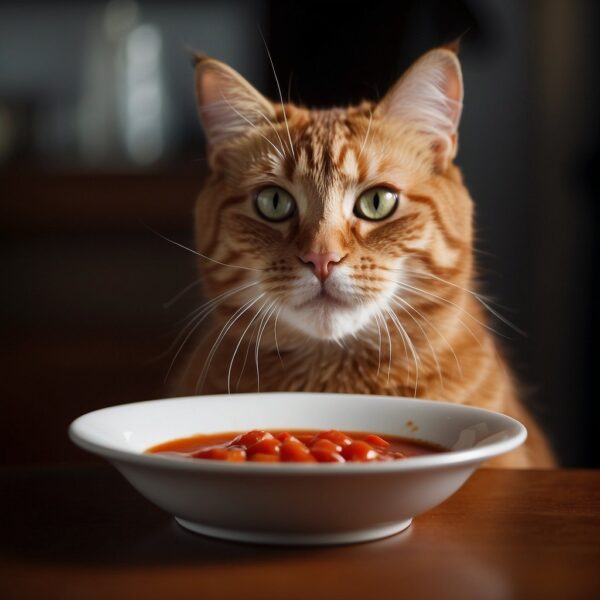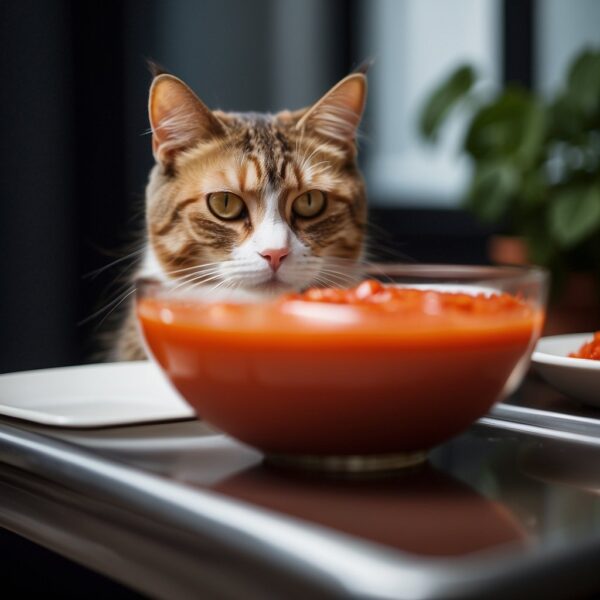
Cats Eating Tomato Sauce is Risky
Cats are naturally curious creatures, often interested in the food their human companions eat, which sometimes includes tomato sauce. However, while cats can eat ripe tomatoes as they are not toxic to cats, tomato sauce poses several potential health risks due to the added ingredients. Garlic and onions, for example, are commonly found in tomato sauces and are known to be toxic to cats. These ingredients can cause gastrointestinal upset and may lead to more serious health issues if ingested in large quantities.
Beyond just the toxic ingredients, the high sodium content in store-bought or homemade tomato sauce can also be harmful to cats. Excessive salt intake in felines can lead to increased thirst and urination, and in extreme cases, can result in sodium ion poisoning. Therefore, while a small lick of tomato sauce might not lead to immediate harm, offering it as a treat is not recommended and can have adverse effects on their health.
Key Takeaways
- Tomato sauce can contain ingredients like garlic and onions that are toxic to cats.
- High sodium levels in tomato sauce are harmful to feline health.
- Offering tomato sauce to cats is risky and generally discouraged.
Overview of cats eating tomatoes
The relationship between cats and tomatoes, particularly tomato sauce, is complex due to various health implications and potential risks associated with certain ingredients. Cats may experience both risks and mild benefits depending on the tomato product’s form and preparation.
Health Implications of cats eating tomatoes
Tomatoes, belonging to the nightshade family, contain a compound called solanine, which is toxic to cats in large quantities. Solanine is more concentrated in green tomatoes and the leaves and stems of the tomato plant. While ripe tomatoes are less harmful, they can still pose risks if consumed inappropriately by cats.
Tomato Sauce Ingredients and Potential Risks
Tomato sauce often includes ingredients harmful to cats such as garlic, onion, salt, sugar, and various spices. Garlic and onion can cause anemia in cats, while high sodium content in salt can lead to excessive thirst, urination, and even sodium ion poisoning. Therefore, tomato sauce, particularly store-bought varieties with these additives, is generally unsafe for cats.
Identifying Safe and Unsafe Tomato Products for Cats
Cats should avoid most commercial tomato products, which often contain spices and seasonings toxic to them. However, a small quantity of fresh tomato, free from skin and seeds, may be safely offered to cats. It’s crucial to distinguish between potentially toxic tomato-based products, like sauces and soups, and plain ripe tomatoes, which might be acceptable in moderation.
Benefits of Ripe Tomatoes in Moderation
In moderation and under careful consideration, ripe tomatoes can offer some nutrients to cats, such as vitamin C, potassium, dietary fiber, and antioxidants like lycopene. However, these benefits are relatively minor since cats, being obligate carnivores, derive their essential nutrition from animal-based proteins rather than fruits or vegetables.

Recognizing and Managing Toxicity in Cats
Cats can experience adverse health effects from ingesting tomato sauce, primarily due to the presence of potentially toxic ingredients and allergens. Understanding the symptoms and immediate responses to toxicity can help ensure the health and safety of your feline friend.
cats eating tomatoes: Signs of Tomato and Nightshade Toxicity
Tomatoes belong to the nightshade family, which contain solanine, especially when unripe or in the green parts of the plant. This compound can cause toxic reactions in cats. If a cat ingests tomato sauce, particularly if it contains high levels of sodium, garlic, or onions, they may exhibit symptoms including:
- Gastrointestinal upset: vomiting, diarrhea
- Neurological symptoms: lethargy, weakness, fainting, seizures
- Other signs: drooling, loss of appetite, pale gums, panting, excessive thirst, abdominal pain
It is important for cat parents to monitor for these signs as they can indicate solanine or sodium ion poisoning.
Immediate Actions and Vet Care for Poisoning
If you suspect your cat has ingested toxic substances, consider these steps:
- Remove the source of toxicity: Prevent further ingestion by removing access to the harmful substance.
- Assess the cat’s condition: Check for any immediate signs of distress or poisoning.
- Contact your veterinarian: Seek professional advice even if symptoms are not yet present.
- Provide details: Clearly describe to the vet what your cat has consumed and any symptoms observed.
Emergency veterinary care may include inducing vomiting, administering activated charcoal, IV fluids, and supportive care to manage symptoms of poisoning, such as gastroenteritis.
Food Allergies and Sensitivities in Cats
In addition to toxicity concerns, cats can have food allergies or sensitivities, which may cause symptoms similar to poisoning, like gastrointestinal distress with vomiting and diarrhea. Ingredients commonly found in tomato sauce may trigger an allergic response or gastrointestinal upset. Regular vet check-ups can help identify any chronic health issues like food allergies, which can present with symptoms such as weight loss, persistent stomach upset, or changes in appetite. Keep a note of any dietary reactions in cats and share this information with your veterinarian to assist in managing your cat’s health.
Practical Tips for Cat Parents
As a cat owner, it is imperative to understand the dietary needs and health implications of introducing new foods to your pet. These tips aim to provide guidance for safe dietary choices and how to handle potential hazards.
Guidelines for Introducing New Foods
When considering new foods for your cat, introduce them gradually. Observe your pet’s reaction closely for any signs of gastrointestinal issues or food allergies. Consistency is key, as sudden changes can cause stress to your cat’s digestive system.
Understanding Cat’s Dietary Restrictions
Cats are obligate carnivores, which means their nutrition must come primarily from meat. Human foods, especially those with spices, garlic, onions, or added sugars, like tomato sauce, should be avoided as they can be harmful.
Emergency Preparedness for Pet Toxicity
Every pet parent should know the symptoms of poisoning such as loss of appetite, excessive urination, or a slow heart rate. Keep contact information for your vet or an emergency pet poison hotline readily available.
Safe Handling of Human Foods Around Cats
Keep human food, particularly toxic items like tomato sauce and foods containing garlic, onions, or chocolate, out of reach. Ensure that food is never left unattended where a curious cat could access it.
Reading Labels and Identifying Dangerous Ingredients
Before offering any human food tidbits, read the labels to ensure they do not contain harmful ingredients. Look out for onions, garlic, chocolate, and xylitol – all dangerous to cats.
Creating a Balanced Diet for Your cat
Prioritize a diet with high-quality commercial cat foods vet-recommended for your cat’s age and health condition. These foods are specially formulated to provide complete nutrition with the right balance of fiber, vitamins, and water content.
Alternatives to cats eating Tomato-Based Foods
If you want to offer your cat an occasional treat outside of their regular diet, consider cat-safe vegetables or a bit of cooked meat instead of tomato-based products. Always remove any inedible parts or dangerous spices.
Recognizing When to Seek Veterinary Assistance
If you suspect your cat has ingested something toxic, do not wait for clear symptoms of toxicity to appear. Immediate consultation with a veterinarian is crucial to protecting your pet’s health.

Cats eating tomatoes: Frequently Asked questions
Cats and tomato-based products have a complex relationship due to potential health concerns. Understanding the safety and risks involved is crucial for feline owners.
Is it safe for cats to consume any tomato-based products?
It is not safe for cats to consume most tomato-based products, as they often contain ingredients, such as garlic and onions, which are toxic to cats. Additionally, these products may contain high levels of salt and other additives that are not suitable for feline consumption.
Are cooked tomatoes harmful to cats?
Cooked tomatoes themselves are not necessarily harmful to cats if they are plain and free from additives; however, they are not a necessary part of a cat’s diet. Caution is advised, as cooked tomatoes are often found in foods that include harmful ingredients to cats.
Why might a cat be attracted to tomato-based foods?
Cats may be attracted to tomato-based foods due to their strong aroma or the presence of other enticing ingredients within the dish. Felines have a keen sense of smell, which might draw them to such foods.
What are the risks of feeding my cat pasta with tomato sauce?
Feeding a cat pasta with tomato sauce can pose several risks including digestive issues due to the high acidity and sodium content of marinara sauce. Additionally, the sauce may contain toxic ingredients like onions and garlic.
Can cats eating tomato sauce cause health issues for cats?
Yes, consuming tomato sauce can lead to health issues such as sodium ion poisoning, seizures, excessive thirst, and urination due to the high salt content. Moreover, sauces often contain spices and additives that can be toxic to cats.
What are some cat-safe alternatives to tomato sauce in human food?
Cat-safe alternatives to tomato sauce in human food include plain, pureed pumpkin or carrot, which can add a similar texture without the risks. Always choose products without added salt, sugar, or spices, and offer them in moderation.